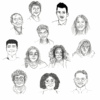Have you ever experienced that frustrating feeling of getting docked points for an opinion question on a test? You know, when you clearly write down your opinion, but still get penalized just because your thinking doesn’t quite match that of the professors, and therefore doesn’t quite answer the question correctly? That feeling is exactly what I experienced during one of my final days on SST.
We were sitting in a room discussing reverse culture shock and I was trying my best to focus when all I could think about was going home, sleeping in my own bed and eating a nice, juicy hamburger. It had been a long couple of days full of 23 final presentations, reuniting with my group-mates, reflecting my experiences, sharing stories and answering the fateful question of “How was SST?” Needless to say, I was exhausted and didn’t want to be thinking about anything, let alone culture shock.My leaders soon began talking about three personalities or roles people tend to take on as they return to their home culture. My mind woke up a little bit, intrigued to find out what type of personality I would be.
The first type of personality was the alienator—the world traveler who never really adjusts back to their home culture. I immediately knew that alienator was not the role I would take on. I like to travel, but there’s something about being home that I will always love.
The second type of personality was the re-socializer—the person who goes back to their home culture and ways of life without much of a fuss. I had a pretty good idea that this was the personality trait I would take on when I returned to the U.S., but I wanted to hear the last one just to be sure.
The last personality trait was the transformer—the person who actively makes change in their own country by using the knowledge they’ve gained on their cross-culture experience. This one I had to think about. I had gained a lot of knowledge and compassion on SST, and I knew I would keep those learnings with me for the rest of my life. However, I also knew myself. As someone who prefers to listen rather than talk, who would rather watch a movie than go to a party and who has never been loud or outgoing, I had a hard time seeing myself as a person who would actively share their learnings with others. I decided that I was probably a re-socializer and I was content with the answer I had chosen.
As we continued our discussion, the words “re-socializer” and “alienator” slowly faded away. Soon all that was left was the word “transformer.” Transformers are compassionate; transformers stand up for injustices; transformers aren’t afraid of being different. Transformers, transformers, transformers.
It became clear to me that we, as Goshen College students, were expected to be transformers. We were expected, no matter our personality, to boldly share our experiences with others. We were expected, no matter our personality, to take our learnings and make change happen in our home culture. We were expected, no matter our personalities, to be transformers. That meant that picking “re-socializer” wasn’t quite the right answer.
This discussion made it seem like my opinion, my thinking, my personality was wrong, and I was frustrated. I understand why Goshen College wants students to take on the role of transformer when they return from SST. The college wants to create a community of global citizens and that’s exactly what a transformer is—someone who is an agent of change. But is it really fair to expect everyone to be a transformer when it doesn’t fit their personality?
As much as I wish that I was a transformer, it’s just not who I am. And it’s not who I should be expected to become. I shouldn’t feel like my answer or my personality is wrong just because it doesn’t fit into Goshen College’s ideals. I’m here to say that it’s okay to be a re-socializer. It’s okay to be an alienator. It’s okay to be a transformer. I’m here to say that you shouldn’t be docked points on an opinion question just because it doesn’t quite match the test-maker’s ideals.




